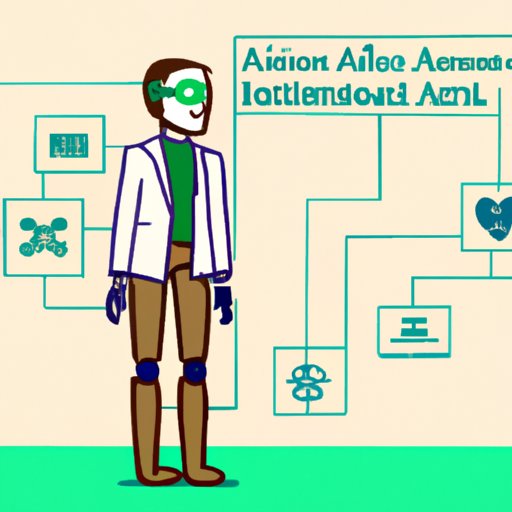Introduction
As technology continues to advance, it’s no surprise that Artificial Intelligence (AI) is being looked to as a potential solution for many of the world’s problems. In the field of medicine, AI has the potential to revolutionize how healthcare is delivered, with some experts believing that AI could even replace doctors altogether. This article will explore the possibility of AI replacing doctors and examine the benefits and challenges of automation in medicine.

Exploring the Possibility of AI Replacing Doctors
AI has already been used in the medical field to assist doctors in diagnosing illnesses and providing treatment recommendations. However, some believe that AI could eventually take over the role of doctors entirely. In order to assess this possibility, it’s important to look at both the benefits and challenges of automation in medicine.

Benefits of Automation in Medicine
One of the main advantages of using AI in medicine is increased efficiency. AI systems can process large amounts of data quickly, allowing them to diagnose illnesses faster than human physicians. Additionally, AI systems don’t require rest or breaks, so they could potentially provide 24/7 access to healthcare. Automated systems also have the potential to reduce the cost of healthcare by eliminating the need for expensive human labor.
Challenges of Training AI to Replace Doctors
The biggest challenge of using AI to replace doctors is training the system to accurately diagnose illnesses and provide effective treatment recommendations. AI systems rely on data to make decisions, so they require access to vast amounts of medical data in order to function properly. Additionally, AI systems must be programmed to handle complex situations, such as determining when a patient needs to be referred to a specialist. Without proper programming, AI systems may not be able to provide the same level of care as human physicians.
Examining the Pros and Cons of AI Taking Over Doctor Roles
In order to determine whether AI should replace doctors, it’s important to consider both the pros and cons of doing so. On the one hand, AI systems could potentially improve the accuracy of diagnoses, as they are less likely to make errors than human physicians. Additionally, automated systems could reduce costs associated with healthcare, as they would eliminate the need for expensive human labor.
On the other hand, there is a risk of errors with AI systems. As AI systems rely on data to make decisions, they may be prone to making mistakes if the data is inaccurate or incomplete. Additionally, AI systems may be subject to machine learning biases, which could lead to inaccurate diagnoses.

Assessing the Impact of Artificial Intelligence on Healthcare
AI has the potential to greatly improve the quality of healthcare. AI systems could provide more accurate diagnoses than human physicians, as they are not subject to fatigue or bias. Additionally, AI systems could help reduce the cost of healthcare by automating tedious tasks such as paperwork and billing. Finally, AI systems could provide 24/7 access to healthcare, allowing patients to receive treatment when they need it most.

Investigating the Ethical Implications of Using AI in Medicine
While AI has the potential to revolutionize healthcare, it’s important to consider the ethical implications of using AI to replace doctors. One concern is algorithmic discrimination, which occurs when AI systems are biased towards certain groups of people. Additionally, there are data privacy concerns, as AI systems require access to sensitive medical data in order to function properly.
Analyzing the Challenges of Training AI to Replace Doctors
In order for AI to replace doctors, the system must be trained properly. This requires access to vast amounts of medical data, which may not always be available. Additionally, programming AI systems to handle complex situations is difficult, as these systems must be able to think like humans in order to provide accurate diagnoses and treatments.
Discovering the Benefits of Automation in Medicine
Despite the challenges of training AI to replace doctors, there are still many benefits to automation in medicine. AI systems can provide more accurate diagnoses than human physicians, as they are not subject to fatigue or bias. Additionally, AI systems could reduce the cost of healthcare by eliminating the need for expensive human labor. Finally, automated systems could provide 24/7 access to healthcare, allowing patients to receive treatment when they need it most.
Conclusion
In conclusion, AI has the potential to revolutionize healthcare by replacing doctors. Automated systems could provide more accurate diagnoses than human physicians and reduce the cost of healthcare. However, there are still several challenges that must be addressed before AI can fully replace doctors, such as limited access to medical data and difficulty of programming AI systems to handle complex situations. Ultimately, the use of AI in medicine will depend on the willingness of healthcare providers to embrace the technology.
(Note: Is this article not meeting your expectations? Do you have knowledge or insights to share? Unlock new opportunities and expand your reach by joining our authors team. Click Registration to join us and share your expertise with our readers.)
